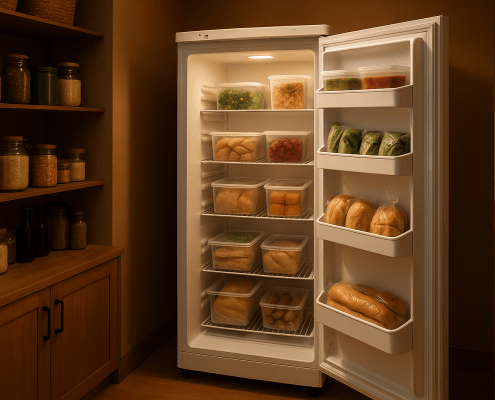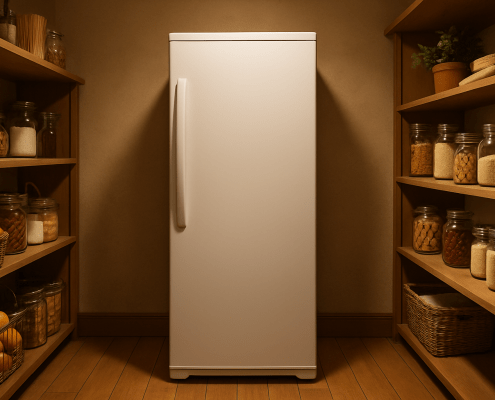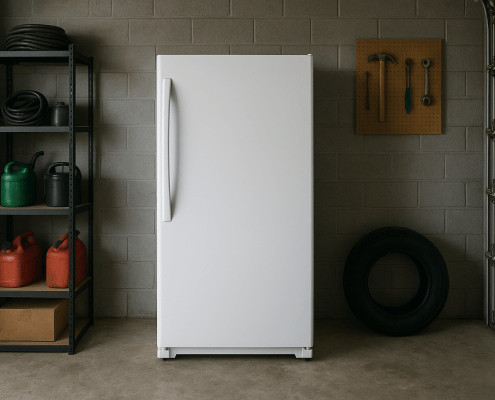Upright Freezer Running Constantly? Here’s How to Fix It
Steven E / Tuesday May 20, 2025
Is your upright freezer running constantly and the compressor never seems to turn off? An overactive freezer can be frustrating, lead to higher energy bills, and could indicate an underlying problem.
Figuring out what’s causing extended run times is the first step to getting your appliance functioning normally again. We’ll walk through the top reasons a freezer runs non-stop and detail how to troubleshoot each one.
The information in this article may not apply to your specific appliance model. We recommend consulting your manufacturer’s documentation or contact us with any questions.
Freezer Basics – How Does It Work?
To understand what makes a freezer run excessively, it helps to first review how a freezer cools things down in the first place.
A freezer works by using a vapor compression refrigeration system.This cycle uses the physics of phase transitions to remove heat from the freezer compartment.
Here are the key components and process:
- Compressor – This is the heart of the system. The compressor squeezes refrigerant vapor which increases its pressure and temperature.
- Condenser coils – After being pressurized, the hot refrigerant passes through these coils where a fan blows air over them. This allows the refrigerant to dissipate heat into the surrounding air and condense into a liquid.
- Expansion valve – The high pressure liquid refrigerant next goes through the expansion valve. This causes the refrigerant to turn into a cold, low pressure mixture of liquid and vapor.
- Evaporator coils – The cold refrigerant flows into the evaporator coils inside the freezer. A fan blows air from the freezer compartment over the coils, which absorbs heat from the air and causes the refrigerant to boil and evaporate.
- Refrigerant line – The low pressure vapor refrigerant is then drawn back into the compressor to repeat the cycle.
This continuous evaporation and compression of the refrigerant absorbs heat energy and keeps the freezer interior cold.
What Causes a Freezer To Run Too Much?
Now that we’ve got the basics of how a freezer works down, let’s check the causes of a freezer running constantly:
1. Dirty or Clogged Condenser Coils
The condenser coils are responsible for releasing heat into the surrounding environment as hot refrigerant passes through them. Over time, these coils can accumulate dust, pet hair, and other debris.
When the condenser coils are dirty, they cannot dissipate heat effectively. This will raise the pressure in the refrigeration system and force the compressor to run longer to achieve the target freezer temperature.
Troubleshooting Tips:
- Clean the condenser coils every 3-6 months using a coil brush or vacuum cleaner.
- If the coils are not accessible, make sure the freezer has proper ventilation clearance (typically a few inches).
2. Condenser Fan Motor Not Working
The condenser fan is an important component that pulls air over the condenser coils to remove heat. If this fan motor fails, heat will build up rather than getting released from the refrigeration system.
A faulty condenser fan motor can cause the compressor to overheat and shut off. Then the freezer temperature will creep up, forcing the compressor to run excessively when it kicks back on.
Troubleshooting Tips:
- Make sure the fan blade spins freely without obstruction.
- Use a multimeter to test if the motor is receiving voltage. Check for around 115 volts unless otherwise specified.
- If voltage is present but the motor doesn’t run, the motor windings are likely burnt out and need replacement.
3. Evaporator Fan Motor Not Working
Similar to the condenser fan, the evaporator fan motor circulates air over the evaporator coils inside the freezer. This allows the refrigerant to absorb heat and keep the compartment at the desired temperature.
When the evaporator fan motor fails, the freezer will have trouble maintaining its setpoint. This results in the compressor running continuously in an attempt to reach the temperature.
Troubleshooting Tips:
- Confirm the evaporator fan blade can spin freely.
- Use a multimeter to test if the motor is receiving voltage. Check for around 115 volts unless otherwise specified.
- If voltage is present but the motor doesn’t run, the motor windings are likely burnt out and need replacement.
4. Thermistor Failure
The freezer thermistor (aka temperature sensor) monitors the compartment temperature. It communicates this data to the control board to activate the compressor and fans when needed.
If the thermistor fails, the control board receives incorrect temp readings. This will throw off the operation cycles and cause erratic running.
Troubleshooting Tips:
- Use a multimeter to check the thermistor resistance. Refer to a resistance vs temperature chart on your tech sheet to see if readings match the freezer temp.
- Replace thermistor if resistance is infinite (open) or shorts to zero.
5. Defrost System Malfunction
Frost inevitably develops on the evaporator coils as the freezer operates. Excess frost will insulate the coils and impede their ability to remove heat from the compartment.
Freezers have a defrost system to periodically melt away this frost buildup. Issues with the defrost components can lead to a frosted evaporator and continuous compressor run times.
Troubleshooting Tips:
- Verify defrost heater and thermostat cycle on and off. Test for continuity.
- Make sure defrost timer advances and triggers heater. Test for voltage on timer contacts.
- Monitor freezer after defrost cycle. If frost remains, not melting fully, replace faulty part(s).
6. Control Board Defect
The control board (main PCB) directs all operations in a freezer based on thermistor temperature input and internal programming.
If the control board is malfunctioning, it can cause erratic compressor and fan cycling that leaves the freezer struggling to maintain its temperature setpoint.
Troubleshooting Tips:
- Check all wiring is secure on control board terminals.
- If behavior persists, replace the control board. Be sure to get an OEM replacement board.
7. Refrigerant Leak
The refrigerant is the lifeblood of the freezer’s refrigeration system. If the sealed system develops a leak, refrigerant can slowly escape. This reduces the system’s ability to efficiently absorb and dissipate heat.
With not enough refrigerant, the compressor will run constantly trying to cool the freezer with less than ideal system pressure and airflow. Refrigerant leaks tend to gradually worsen over time.
If everything else checks ok, then you possibly have a refrigerant leak. This will require an HVAC certified technician to repair.
Wrapping Up
Thanks for reading! If you have any other appliance repair needs or projects, you can find other resources and our DIY blog at AppliancePartsPros.com. There, you can enter your model number to order the exact parts you need. Most orders arrive in 2-3 business days.
We’re here to help! You can reach our award-winning customer service team at 1-877-477-7278, chat with a pro on our website and watch thousands of free video tutorials on our YouTube channel.
With nearly a decade of experience in providing top-notch customer service regarding appliance parts and repair, Steven enjoys sharing practical advice, troubleshooting tips, and interesting information to help readers stay informed.





